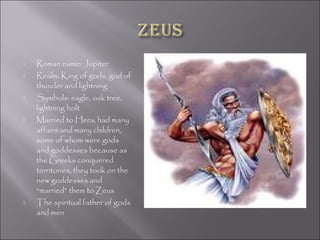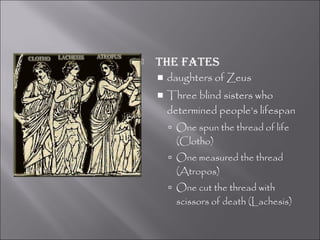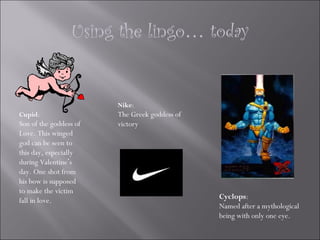Introduction to-greek-mythology-powerpoint
- 1. By: AK Rosal & KL Arboladura
- 2. Traditional stories of gods, kings, and heroes Show the relations between gods and people Mythology was a form of early science to Greeks because it helped explain the unexplainable.
- 3. Myths seek to explain all those unexplainable or unknowable aspects of life. Where do we go after we die? How was the world created? Why can we see our reflection in water? Why are there four separate seasons? Why do we fall in love? How is lightning created? Why do our voices sometime echo? How was fire created, and why do we have it?
- 4. Fully developed by about 700 B.C. Homer and Hesiod are generally considered the earliest Greek poets whose work has survived
- 5. Death is inevitable and final, so the goal was to become a legend through great deeds. The Greeks were tough, restless, ambitious, hard-living, and imaginative. Honor was extremely important, and the Greeks were very vengeful if wronged. The gods mirrored human feelings and physical form. Their flaws were pride, cruelty, stubbornness, impulsiveness, lust for power, and a desire to be like the gods.
- 6. First there was Chaos (vast and unorganized space from which all other things originated). Chaos gave birth to Gaea, the earth, and Night, which gave birth to day. Gaea and Uranus (the sky) gave birth to Cronus and the other Titans, the Cyclopes, one-eyed giants, and the Hecatonchieres with 50 heads and 100 arms apiece.
- 7. In general, Greek gods were divided into three categories: Heaven Earth Sea The Titans ruled before the Gods of Olympus. The Titans were the children of Uranus (Heaven) and Gaea (Earth) and the parents of the Gods of Olympus. The Titans were overthrown by Olympians.
- 8. Cronus mutilated his father and overthrew him. Cronus and Rhea married and produced the Olympians: Hestia, Demeter, Hera, Hades, and Poseidon. Cronus swallowed them to keep from being overthrown. When Zeus was born, Rhea gave her husband a rock to swallow. Zeus overthrew his father Cronus and forced him to disgorge the other Olympians.
- 9. How did humans get fire? Prometheus was the wisest Titan of all. Prometheus is credited with bringing enlightenment to humans. Prometheus stole fire from the gods and gave it to humankind, bringing the power of warmth and light to the dark and miserable earth. Prometheus acted against the express wishes of the Olympian Gods, who wanted to keep the power of fire - enlightenment - for their exclusive use. For this Zeus punished Prometheus by having him chained to a rock with an eagle tearing at his liver.
- 11. A group of 12 gods who ruled after the overthrow of the Titans All the Olympians related in some way Named after their dwelling place, Mount Olympus The Olympian Gods: Zeus, Poseidon, Hades, Hestia, Hera, Ares, Athena, Apollo, Aphrodite, Hermes, Artemis, and Hephaestus
- 12. Roman name: Jupiter Realm: King of gods, god of thunder and lightning Symbols: eagle, oak tree, lightning bolt Married to Hera; had many affairs and many children, some of whom were gods and goddesses because as the Greeks conquered territories, they took on the new goddesses and “married” them to Zeus The spiritual father of gods and men
- 13. Roman name: Juno Realm: goddess of marriage Symbols: peacock, cow Married to Zeus Jealous of Zeus’s affairs Because of this, asked a 100- eyed giant to watch him. When Hermes put the giant to sleep, she turned him into a peacock, an animal with eyes on its tail feathers.
- 14. Roman name: Vesta Realm: goddess of hearth and home; protector of the sacred fire Symbol: torch, a distaff (hand-held loom) Zeus’s sister Six priestesses called Vestal virgins attended her temple and protected the fire; shrines were built to her by the fireplace in homes Today the word vestal means “pure” or “virginal”
- 15. Roman name: Neptune Realm: god of the sea and earthquakes Symbol: trident Zeus’s brother Controlled earthquakes, hurricanes, rough seas, tidal waves Gave the horse to mankind
- 16. Roman name: Pluto Also called Dis, the rich one (because he owned all the minerals in the earth) Realm: god of the Underworld Symbol: Cerberus, cypress, bident Rarely visited Earth Not friendly, but not evil either
- 17. Charon, who rowed people across the river Styx Cerberus, the 3-headed dog who guarded the underworld
- 18. Roman name: Mars Realm: god of war Symbols: dogs of war; vulture, weapons Son of Zeus and Hera Very unpopular No myths written about Ares
- 19. Roman name: Diana Realm: goddess of the moon, the hunt, and (sometimes) witchcraft Symbols: crescent moon, bow and arrow, short hunting robes Apollo’s twin sister Avoided men She turned Acteon, a hunter, into a stag (deer) and set his own dogs on him because he watched her bathe.
- 20. Roman name: Venus Realm: goddess of love, beauty, sexuality Symbols: shell, mirror, dove, swan Born of the foam when Cronus’ genitals hit the ocean Married to Hephaestus Son was Eros (Cupid)
- 21. Roman name: Vulcan Realm: god of the forge; made Zeus’s lightning bolts and the armor for war Symbols; the forge Son of Zeus and Hera Zeus threw him out of heaven for siding with his mother (Hera) Husband of Aphrodite, who was constantly unfaithful to him
- 22. Roman name: Ceres Realm: goddess of agriculture Symbols: sheaves of wheat Zeus’s sister, mother of Persephone Persephone was kidnapped by Hades. Demeter created eternal winter on earth until Zeus agreed to bring her back. She had eaten 6 pomegranate seeds and so had to remain in the underworld for 6 months of the year.
- 23. Roman name: Minerva Also called Pallas Athena Realm: goddess of defensive warfare, wisdom, handicrafts Symbols: armor, owl, olive tree Emerged from Zeus’s head fully grown City of Athens named for her after she gave them the olive tree Also created the spider
- 24. Roman name: Apollo Realm: god of light (the sun), music, shepherds Symbols: bow and arrow, the sun chariot, the lyre (small harp) Some myths say he drove the sun chariot, others give this job to Helios His son Phaeton tried to drive it and burned part of the earth Always shown in pictures as being young, beardless, and
- 25. Roman name: Mercury Realm: messenger of gods; god of commerce, thieves, science (sometimes medicine) Symbols: winged helmet or sandals, caduceus (medical staff with 2 snakes) Created the lyre, which he gave to Apollo when Apollo caught him stealing his cows
- 26. Roman name: Bacchus Realm: god of wine, revelry, drama, Symbol: grapes Brought pleasure and insanity (from wine) Followed by the Maenads, crazed women who tore people apart, the satyrs, centaurs, and nymphs First plays were presented during the festivals of Dionysus Popular “party animal” Not typically considered an “Olympian” god
- 27. the muses Nine goddesses in charge of different sciences and arts including music, poetry, history, astronomy, dance, etc. Daughters of Zeus They were meant to inspire
- 28. the fates daughters of Zeus Three blind sisters who determined people’s lifespan One spun the thread of life (Clotho) One measured the thread (Atropos) One cut the thread with scissors of death (Lachesis)
- 29. Mythology in nature and science Many of our planets (and many moons) are named after Roman gods Mercury- messenger god Mars- god of war Venus- goddess of love Jupiter- king of the gods Saturn- god of agriculture Neptune- god of the seas Uranus- ancient Greek deity of the heavens Pluto- god of the underworld
- 30. Using the lingo… today Cupid: Son of the goddess of Love. This winged god can be seen to this day, especially during Valentine’s day. One shot from his bow is supposed to make the victim fall in love. Nike: The Greek goddess of victory Cyclops: Named after a mythological being with only one eye.






























